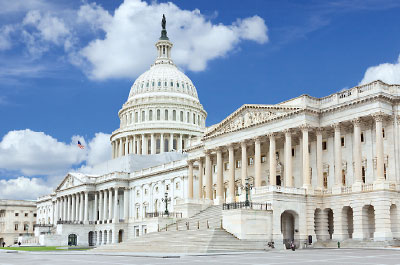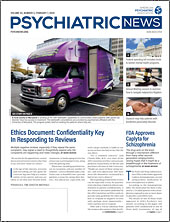For Fiscal 2020, the federal government earmarked billions of dollars to bolster several initiatives key to helping people with mental health and substance use disorders (SUD).
Congress’s 2020 spending bill authorized a significant increase in funding for medical research. The National Institutes of Health’s (NIH) budget was increased by $2.6 billion—an increase of almost 7%—while the National Institute of Mental Health’s budget rose by $155 million.
NIH and the Centers for Disease Control and Prevention (CDC) each received $12.5 million for researching firearm injuries. Last year, APA joined five other medical organizations in a letter to Congress calling for funds to study injuries and deaths related to firearm violence (
Psychiatric News).
In total, the CDC received a funding boost of about $362 million over its 2019 budget, and the Health Resources and Services Administration received a little over $172 million in additional funding.
The spending bill also appropriated a significant amount of funding toward combatting the opioid epidemic, including the following:
•
$1.5 billion for state opioid response grants.
•
$800 million for research within the NIH.
•
$26.7 million to establish grants to train professionals to provide treatment for mental illness and SUD.
•
$12 million to repay student loans for the SUD workforce.
“Research for addiction and mental health is years, even decades, behind where other fields, like cardiology, are today,” said Anil Thomas, M.D., a clinical assistant professor at NYU Langone Health and member of APA’s Council on Addiction Psychiatry.
Increased funding for research is especially heartening, Thomas said, because it suggests stigma toward people with SUD may be dissipating. “Years ago, it was looked upon like a moral failing,” he said.
Funds to study opioid addiction, he said, will also impact other areas within mental health. “Each new discovery in addiction has a downstream effect to help us figure out, ‘What is depression? What is mental illness?” Thomas said. “It adds to that rich pool of knowledge.”
Increasing funding for education and training is also hugely important. It takes a team of clinicians to treat SUD, Thomas said, from psychiatrists and social workers to counselors and peers. Ensuring everyone is educated about how addiction works will only further benefit patients.
Minority Fellowship Program Gets Increase
The 2020 spending bill also allocated $5.9 billion—an increase of about $140 million over the 2019 budget—to the Substance Abuse and Mental Health Services Administration (SAMHSA). The agency’s Minority Fellowship Program received $14 million, a $1 million increase over last year. (In 2018, SAMHSA nearly doubled the annual funding given to APA for the fellowship program. See
Psychiatric News.)
Additional funding could mean new opportunities for the program, said American Psychiatric Association Foundation (APAF) Senior Program Manager Camille A. Bryan, Ed.D., who manages the APA/APAF SAMHSA Minority Fellowship Program. The program aims to increase the number of psychiatrists committed to addressing the mental health needs of minority patients and their communities. APAF is among seven organizations designated to receive grant awards annually for the program; it receives about $1.42 million annually.
Deepak Penesetti, M.D., founder and CEO of Session Together and chair of the APA/APAF SAMHSA Minority Fellowship Selection Committee, was a fellow in 2015.
“It really changed the trajectory of my entire career,” Penesetti said. “As a medical student or resident, you’re often having very nitty gritty, nuts-and-bolts conversations.”
Being able to have population-level conversations through the fellowship, he continued, especially as it relates to marginalized communities, often reawakens the very reason that brought fellows into psychiatry in the first place.
A larger budget, Bryan explained, could translate to an increase in the number of fellowship slots available, or additional mentoring or networking opportunities for fellows. In the 2019-2020 fellowship year, 65 residents applied for 28 availble slots for APA/APAF’s Minority Fellowship Program.
“Now, in every conversation I have with my colleagues, I’m bringing up important topics,” Penesetti said, like pointing out how a patient’s cultural context may impact his or her care. “Suddenly, you’re not just affecting your patients; you’re helping your colleagues become more culturally aware, too.” ■
The press release “APA Applauds Mental Health Funding in Federal Spending Bill” is posted
here.


